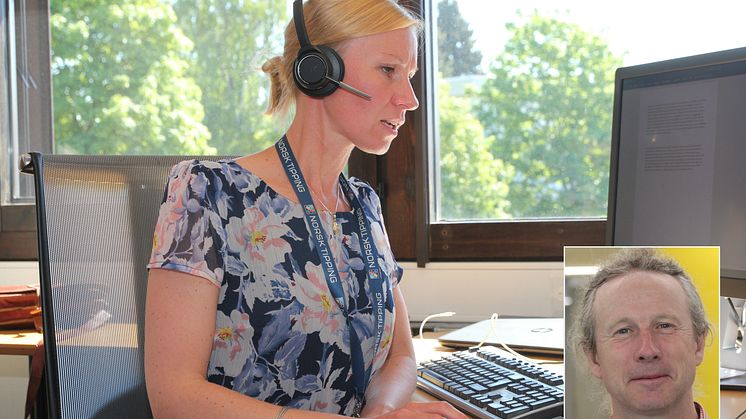
Blogginnlegg -
New research: Changing the habits of gamblers by just one phone call
By Jakob Jonsson
Psychology specialist
Sustainable Interaction/Stockholm University
«Hello, my name is X and I’m calling from Norsk Tipping. Right now we’re contacting those of our customers who have lost the largest amounts of money in the past year. You are one of them. Is it convenient for you to talk to me now?»
This is roughly how the proactive phone calls that Norsk Tipping has been making since 2014 begin. I have been fortunate enough to participate in the project as an external researcher.
No VIP customers
Normally, gambling companies contact their customers to persuade them to carry on gaming. Customers who have lost most are usually looked on as VIP customers. That’s not the case at Norsk Tipping, which has taken into account what the research community has known for many years.
It’s among the big customers where we find the largest number of people for whom gaming leads to problems. This is why Norsk Tipping calls those customers who spend most money on gaming to inform them about their spending, motivate them to change and encourage them to use tools that promote responsible . The hope is that they will be able to make conscious decisions about how much they play and that this will lead to more “sustainable” spending.
Norsk Tipping is not the first gaming company in the world to make such phone calls, but as far as I’m aware it is the first to initiate a full-scale research project involving a large number of customers.
Reduced their spending
Following a pilot study in which about 80 customers were contacted, a post-pilot project involving almost 400 phone calls developed the concept further. As a result, customers who were contacted reduced their levels of spending, and in most cases responded positively to receiving such calls, even though they were unexpected and dealt with something as personal as their habits.
All in all, the results were so promising that in 2017, Norsk Tipping decided to pursue collaboration with Stockholm University to carry out a major scientific study, with the approval of the Swedish Ethics Council in Stockholm.
A little over 3000 individuals were involved in the study, with 1005 groups of statistical triplets, in which each member had the same gender, age and level of loss. One member of each group was selected for phone contact, one to receive a letter, and one was included in a control group that was not contacted at all. In this way we created three equal-sized groups of randomly selected persons from among the customers who lost the most money.
The results were clear:
- Receiving specific information about their spending, accompanied by information about what can be done to reduce that spending, had a marked effect.
- Receiving a phone call had greater impact than receiving a letter.
- Receiving a letter had significantly more impact than not being contacted at all – as was the case with those in the control group.
The study compares the customers' stakes/bets during the 12 weeks prior to the conversations/letters to the 12 weeks following the intervention. These were the results:
- Phone call: Stakes/bets were reduced by an average of NOK 48507 (€ 5110) per customer, theoretical loss* reduced by an average of NOK4 746 (€ 502)
- Letter: Stakes/bets were reduced by an average of NOK 16167 (€1702), theoretical loss reduced by NOK 7573 (€ 797)
- Control group: Stakes/bets increased by an average of NOK 986 (€ 103), theoretical loss reduced by NOK 481 (€ 50)
Loss limits
The most frequent topics discussed in the phone calls involved information about how much the customer had lost and the possibility of setting loss limits. Few customers chose to stop gaming altogether. Even fewer – about 1 per cent – were interested in information on how to contact the Gaming Help Line. We could also see that a phone call clearly increased the motivation of a large majority of customers to change their gambling habits, which in turn had a significant effect in the form of reduced gaming addiction.
How should we interpret these results? Are the players unaware of what is happening? Are they not rational consumers making conscious decisions? The truth is that most are not very aware, and underestimate how much they have lost. When asked to estimate their losses, they guess between 20 and 60 per cent of the actual figure. The reason is that players sometimes win and sometimes lose, and that they tend to remember their gains better than the losses.
Moreover, players lose money gradually, and the more continuously they play, the more difficult it is to keep track of how much one has spent overall. It is difficult to talk about rational choices with those players who develop gaming abuse and gaming addiction. For these, it is more a matter of loss of control and attempting to win back what they have lost.
How much can I afford?
Being shown in black and white how much they have lost provides players with insight. It also gives them the opportunity to think differently. “You lost 75,000 kroner gaming last year. Do you intend to put aside 75,000 kroner for gaming next year too?” Customers who answer “no” (as is almost always the case) are usually prepared to reduce their loss limits with the help of the customer adviser they are talking to.
It is natural to ask whether Norsk Tipping will lose money by contacting customers who lose large amounts. The answer is undoubtedly “yes”, at least in the short term. Getting customers to reflect on how much they can afford to lose and what they want to do results in them gaming less, often thanks to the limits they have set. We know less about how this develops in the long run. However, it is clear that the owners of gambling companies that contact their customers in the same way as Norsk Tipping must put social responsibility before their own gain and be prepared to forego income that results from customer overspending.
* Theoretical loss = stakes/bets minus average winnings (Return To Player). Some instant games, like online casino games, have an RTP average of eg. 96 percent.
Contact information Jakob Jonsson
Email: jakob@sustainableinteraction.se
tel: +46 (0) 70 619 93 70
Additional information, Norsk Tipping:
Tanja Sveen, Senior Adviser Responsible Gambling
Email: tanja.sveen@norsk-tipping.no
Tel: +47 994 40 319


